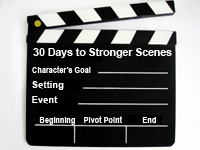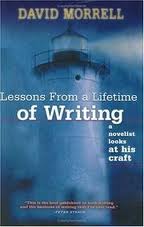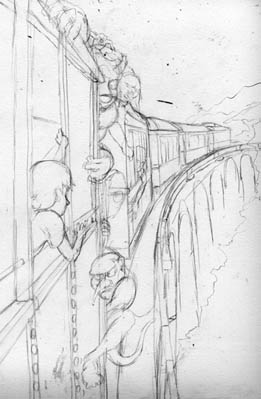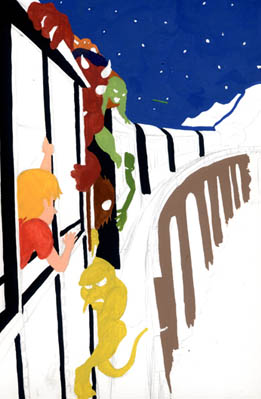Viewing: Blog Posts Tagged with: long, Most Recent at Top [Help]
Results 1 - 4 of 4
Blog: Young Adult (& Kid's) Books Central (Login to Add to MyJacketFlap)
JacketFlap tags: review, long, chameleon, Add a tag
Blog: Darcy Pattison's Revision Notes (Login to Add to MyJacketFlap)
JacketFlap tags: book, fiction, novel, long, scene, write, short, how to, novel revision, length, Add a tag
 Join us on Facebook for a discussion of scenes.
Join us on Facebook for a discussion of scenes.
Featured Today in Fiction Notes Stores
Best Length for Scenes?
What’s the best length for a scene? IS there a best length?  In his book, Lessons from a Lifetime of Writing, action/adventure author, David Morrell (creator of the Rambo character, among others), says he tries to write short chapters (or we can translate this to scenes, too), so that a reader can complete one chapter (or structural unit, i.e. a scene) at one sitting.
In his book, Lessons from a Lifetime of Writing, action/adventure author, David Morrell (creator of the Rambo character, among others), says he tries to write short chapters (or we can translate this to scenes, too), so that a reader can complete one chapter (or structural unit, i.e. a scene) at one sitting.
He bases his ideas on two essays by Edgar Allen Poe, The Philosophy of Composition and The Poetic Principle. Poe argues that short scenes/chapters are better because they accommodate the human form which needs to move around. We get up to go to the bathroom, to relieve a hurting back, etc. By keeping scenes short, you will keep the reader turning pages and actually reading every word.
Morrell says he keeps his structural units small in order to accommodate the reader’s bladder, TV interruptions, phone calls, a neighbor who drops in, etc. Poe’s essay is worth reading, as is Morrell’s chapter on “The Tactics of Structure.”
So, there’s not really a right or wrong. I’ve read 30 page scenes and I’ve read 1/3 page scenes. Whatever works. But if in doubt, short is better than longer. (Kinda reminds me of blog posts! Short is often better.)
 |  It's Here. |
Blog: Steve Draws Stuff (Login to Add to MyJacketFlap)
JacketFlap tags: weekend, work, boy, class, progress, monsters, long, finished, time, colored, chase, room, train, locomotive, wifes, almost, away, Add a tag



WOW! Last week was about as busy a week as I've had in a long time, and the really weird thing about it is that I didn't do a single piece of illustration or design work. Not one!
This week is my wife's first back at school and it's a new school to boot. Because of that I spent all of last week moving everything from her old classroom that we had plopped down into storage, out of storage and into her new room...by myself.
You may not think that sounds like a whole heck of a lot, but this woman has collected a LOT of books in her twelve years of teaching and a lot of books mean a lot of heavy boxes. We actually had to rent a 16 foot U-Haul in order to move all this stuff.
After the moving was done I spent a good eight hours a day, every day, moving desks, moving tables, organizing papers, papering her walls, hanging stuff on those walls, creating more stuff to be hung on those walls, then hanging that created stuff up!
Toss in the fact that the air conditioning wasn't working because the school was still being built, and it was well over 100 outside and you've got a recipe for a tired and very stinky me.
Anyway, all is well that ends well I suppose, and her first day back went decently so I guess it was worth it.
She's going to owe me though...oh yes, she surly is...
Hopefully I can find some time this week to put the kibosh on this darn monster piece.
Steve~
Blog: Bookseller Chick (Login to Add to MyJacketFlap)
JacketFlap tags: Opinion piece, ranty, Chick Lit, long, Para Porn, Add a tag
I’m one of those people who hates unsubstantiated book snobbishness.* You want to hate something and tell everyone around you that it is part of the ever growing corruption of Literature or the female mind or the male mind or a child’s mind. Great. But the biology major in me says prove it. Back it up with facts, figures or something beyond your subjective thoughts and conclusions drawn from a complete lack of scientific evidence. If you can’t do that, then stick with what you can back up: why you did or did not like it. Which means, of course, you would have to actually read something that represents what you claim is corrupting.
It’s like writing a high school book report:
“I did not care for the use of Melville’s Billy Budd in this A.P. English curriculum because the heavy reliance on the reader to grasp Melville’s Christ allusions, which requires the reader to be of, or have a passing familiarity with, the Christian faith. In a country that houses a multitude of different religions and many non-practicing people, I feel that this is a novel’s narrow focus…yadda…yadda…yadda…spend the next two pages supporting argument.”
Notice the paper starts with an “I,” singular, and proceeds to outline the thesis (which, if it’s a good essay, will also address counter arguments), and does not attack the whole of English Literature. The essay is not calling for the removal of Budd, simply supplying the thoughts of the reader on its suitability for high school classroom use after having read the whole damn thing. And I’m cool with that, just as I’m cool with reader reviewers. I like hearing readers’ thoughts and opinions on novels. I’m interested in reading what different people liked and disliked, what allusions are obvious to some and not to others, etc. That’s interesting. We’re all going to take something different away from a reading experience—some of it universal and some of it not—and not all of it is going to be everyone’s cuppa, which is why an informed reader may seek out many different reviews on the same subject to form their own opinion about whether or not to give this book or that one a try.
Denigrating an entire genre, sub-genre, or type of book when you’ve barely read any of the titles housed there-in? Not interesting, just sloppy. Very, very sloppy.
So when I first read the Independent’s article on Horror that I outlined in my last column, I was more than a little taken back on the bit (and yes, I mean that with all British connotations) tacked on to the bottom addressing the popularity of “Para Porn.” This would be Urban Fantasy or Paranormal Romance for those who might be wondering. Two different sub-genres (actually three as they throw Stephanie Meyer’s Twilight into the mix) all smashed together in a derogatory way because, according to the experts, this does not deserve to be mentioned within the same breath as Horror.
How derogatory? Well let’s see:
“Horror expert Steve Jones says that "Para Porn" represents a new genre, though he regards it disdainfully as women's fiction rather than horror. "It's aimed at a different audience to traditional horror," he says, with the hint of a sneer.”
Wow, it’s not Horror because it’s Women’s fiction, not because it doesn’t contain traditional Horror elements, but because it is aimed at women or has female protagonists who have sex. Gotcha. I see the light! You have converted me to your higher purpose! And, gee, thanks for clearing that up for me. If I still worked at a bookstore I would put up a sign warning all my male customers away from buying the Kim Harrison or Kelley Armstrong novels (because men did indeed buy them), and instead direct them to the more Manly novels of King and others. Because women surely do not read Horror! Gads, no, nor do they make up a large percentage of the book buying population. Obviously these books need to be placed all together and quarantined away from serious Horror.
Sarcasm aside, I’m slightly amused by the fact that even as it’s considered porn, the publishers admit that “they are starting to sell really well over here.” And that even as they denigrate the influence that Buffy that Vampire Slayer may have had on this growing trend of kick-ass heroines, they praise it for resurrecting the Horror genre (see the first part of the article). I think this is truly the definition of a back-handed compliment, or maybe they’ve been reading The Game and this is really a come on. Hiding a compliment in an insult will really capture a girl’s attention, you know.
But I’m willing to give the British publishers a bit of a pass in that they recognize what people are reading and that it is a boon to what had previously been a dead genre. Maureen Dowd does not get the same kind of treatment. She had to go and resurrect the old “Is Chick Lit sucking the brains out of the female population? Why yes it is” argument and then proceed to make mistakes all over the place, which are addressed here, here and here. I wouldn’t even mention Dowd (and why she chose to discuss a four year old argument now since other writers have done a much better job of covering the fiasco) except for the fact that her argument echoes that of the British pubs in the whole “it’s focused towards women and therefore has no redeeming value” opinion, which saddens me.
It’s 2007, folks. I realize that I’ll never be able to wrestle the classics from the cold, dead hands of a bunch of old white guys, but can’t we open our eyes a little? Can’t we begin to realize that everyone brings something to the table? The people read for a myriad of reasons and therefore will be attracted to a myriad of different genres and reading levels? That we cannot command the reading public to like one thing and dislike another just because we feel that it is not up to our superior standards?
And why, WHY!, does the fall back insult/argument still have to be about women? Oh, you know, only women read that. It’s Women’s fiction, and not worth my time. This will only appeal to women.
Well, guess what, buckos. Readers change. The reading environment has changed. And while it is still hard to get men to pick up a book written by a woman, I wonder how much of that is a negative feedback loop we, as a society, have created by telling them they won’t be interested because it’s “Women’s fiction.” If I, as a woman, can identify with a male spy/playboy is it really that hard for a man to read a story told from the point of view of a female lawyer or cop?
I’m not asking them to walk a mile in a Chick Lit heroine’s Manolos (if that heroine even owned Manolos, a shoe stereotype that owes more to Sex and the City than any Chick Lit novel I’ve ever read), nor do I think it’s necessary for me to shove my size eights into one of Don Pendleton’s character’s army boots to understand what some men see in his novels. Some books will play out better to a more masculine audience and some to a more feminine, which is something I accept.
That doesn’t mean, however, that one book is better than the other or that you can even compare apples and oranges. Had Maureen Dowd sat down with those thirty-odd Chick Lit novels and discussed why she, and solely she, couldn’t get into them, then maybe I would have understood where she was coming from. Maybe. But she seems to be missing the point that the Horror publisher’s at least got that any fiction genre and its popularity hinges on the public’s need for escapism of some sort (whether it is escapism with a side of trying to understand the world around them or simply to fully escape the world around them). Chick Lit at its best fulfills that same need by taking the pressures many women suffer under (trying to do well at a high-pressure job, find someone to spend their life with, and achieve some type of economic stability even if it can only be measured in shoes) and discussing it a fun, one-on-one manner.
Telling someone that their time would be better spent reading The Red Badge of Courage misses the point. My time, and what I do with it, is my time and until it affects the great and judgmental you in some detrimental way you don’t have a right to infringe upon it. Maybe my time would be better spent writing my own memoirs, or cooking up enough dinners to freeze for the next few weeks, or helping the homeless, or (in my personal case) finding a job. And maybe most of my time, or your time is spent doing this, and worrying about that, and dealing with that other thing.
But maybe we need to channel that tension of all the things we should be doing or having to do into some sort of release, find something to open that pressure valve and let it all out so that we can continue to function as proper members of society. And maybe we find that in books that let us relax, escape our world for another or teach us in some funny, distant way to handle it. If it educates us at the same time, great, but what stands for education is subjective as well.
If it expands my vocabulary, does it count?
If it educates me in pop culture, something that our world trades upon as heavily these days as solid facts, have I wasted brain space or increased my knowledge in other areas more accessible to those around me?
If it gives me a breather, takes me away from this world for 400 pages, and allows me the distance I need to later revisit what is going on around me and perhaps deal with it critically, is it not performing the greatest public service of all?
There is a reason fiction—of all kinds—exists, and it is up to the reader whether they choose to read to learn, to think, to escape or all three. And beyond introducing new titles and authors to try, there is nothing you or I can do about it. So stop trying to tell someone what they shouldn’t read, and pick up a new book.
You might be pleasantly surprised when something that constitutes Para Porn or Chick Lit appeals to you. And if they don’t, well then, you have something slightly more empirical to back up your arguments when someone asks you why not.
*I’ve been doing pretty well with my own snobbishness when it comes to role-playing books and game, thanks to some wonderful customers I had that were very open but their thoughts and opinions on the subject.





I hate moving, too.
The moving company packed up everything but my underwear drawer.
Yeah, I would've had them pack up my underwear, too... but they said they'd have to find a bigger moving box.
I kid.
Bu-Dum-Ching.
You're a regular Mel Zets I tell ya.